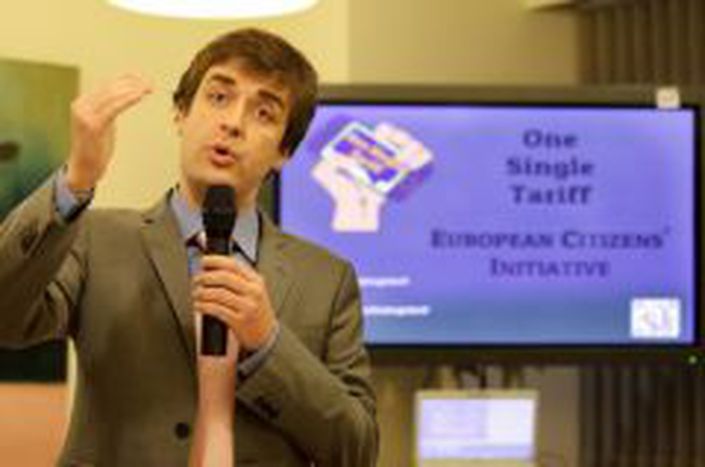
Operators of Europe, unite!
Published on
By Jan Nils Schubert. Calling your grandmother in Italy, texting your girlfriend in Romania or watching news on your Belgian mobile phone while on vacation in Sweden...Thanks to the newly launched ‘One Single Tariff’ act, all this might be soon possible without costing the earth.
As part of the European Citizens Initiative, two young French citizens are on a mission to tackle the challenge of roaming charges.
On December 7th, the European Citizens Initiative'sOne Single Tariff Act was launched at the European Economic and Social Committee (EESC). Initiated by two young European citizens, the target is the mobile telephony market. The act speaks for itself: it is time to end “rip-off” of roaming charges
Roaming charges: reaching for a single market
Every time you leave your home country and you are using your mobile phone, you are roaming. You are using a foreign operator’s network and are therefore paying additional costs, which are on average five times higher than normal. And while some find out the hard way, the EU has been trying to limit these roaming charges by decreasing “Eurotariffs”since 2009. But, is this all that can be done? No, says Vincent Chauvet, one of the EIC’s initiators.
“Some people talk about fair-roaming, but this is a contradiction in terms. Dropping the price of a mega-octet by only 2 cents every year is not enough”.
"We want to be able to call, text and download data from any country in Europe at the same price” explains his colleague, Martin Wittenberg. Recalling his student days, the 26 year old claims: “We are the Erasmus generation! We need these services”, and adds:
“Mobile Phone companies are making huge profits with roaming charges. If people could actually pay less, they would be able to use the savings to buy new services for their smartphones and digital tablets.”
What challenges lie ahead?
"We need your time” says Martin. The EIC is looking for people to sign their proposal and their aim is to reach one million signatures in a year's time. They're also looking to promote the initiative through social media. They have already garnered support from Alain Lamassoure (MEP) and Henri Malosse, President of the Employer's Group at the EESC and the first signatory of the initiative. In his speech, Mr. Malosse expressed his support for the effort to “improve the single market against existing cartels”. As for the EIC, he called it “the only progress that came out of the treaty of Lisbon” adding: “...we want to be the voice of the European civil society and not the opposite”.
The stated objective is to hand over the project to the Union in six months. The European legislator will then decide on the follow-up. “The operator’s lobby is strong” says Vincent.
And if the devil is in the details, Vincent says confidently: “”."Maybe, the number of calls will be limited. And there is still the issue of exemption for Overseas countries and territories. But the more signatures we have, the more pressure we can put on the legislator."



